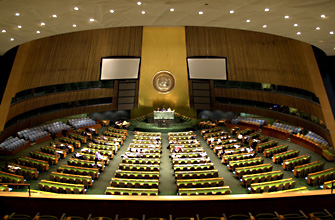 |
Thursday, 7 March:
UNFF-2 participants spent the day in two working groups. Working Group
I started with a discussion on combating deforestation and forest degradation,
and then moved into talks on forest conservation and protection of unique
types of forests and fragile ecosystems. Working Group II discussed MAR
and associated concepts, terminology and definitions, and subsequently
initiated debate on criteria for the 2005 review of the effectiveness
of the international arrangement on forests. |
| |
Working
Group I:
combating deforestation and forest degradation |
<
Bai-Mass Taal, UNEP Division of Policy Development and Law, introduced
the discussion paper on combating deforestation and forest degradation.
Its conclusion states that significant progress has been made in
implementation of IPF/IFF Proposal for Action, but deforestation
continues, albeit at a slow pace. He said that the dichotomy between
implementation and deforestation could be explained by lack of resources,
capacity and political will.
 Listen
to UNEP's introduction Listen
to UNEP's introduction |
| |
 Venezuela,
for G-77/China, stated that the root of deforestation is in
socio-economic injustice. He highlighted the negative impact of
lack of access to Northern markets, and stressed the need to unify
criteria and indicators to allow for their comparisons between countries
and regions. Venezuela,
for G-77/China, stated that the root of deforestation is in
socio-economic injustice. He highlighted the negative impact of
lack of access to Northern markets, and stressed the need to unify
criteria and indicators to allow for their comparisons between countries
and regions. |
| |
<
Senegal highlighted the importance of information dissemination
and the decentralization of natural resource management. He noted
the problem of overlapping agreements and the stress of participating
in many meetings, and called for concerted and coordinated approach
to implementation.
 Listen
to Senegal's statement Listen
to Senegal's statement |
| |
|
<
Japan supported the report's assessment that forest fires, illegal
logging and perverse subsidies are emerging issues, and should be
addressed cross-sectorally. |
| |
<
USA said that UNFF is about promoting and facilitating implementation
of existing proposals for action and not should not create new proposals.
She noted the relationship between agriculture and deforestation,
and highlighted several priority areas that required additional
emphasis: land tenure issues, resource rights clarification, domestic
policy on infrastructure and subsidies, destructive illegal and
logging, and corruption..
 Listen
to USA's statement Listen
to USA's statement |
| |
 G-77/China
invited the donor community and the Collaborative Partnership on
Forest to develop capacity development programmes. He said that
the UNFF should add a study on market access distortions to its
agenda. G-77/China
invited the donor community and the Collaborative Partnership on
Forest to develop capacity development programmes. He said that
the UNFF should add a study on market access distortions to its
agenda. |
| |
|
<
View from the back of the ECOSOC Chamber, location of Working Group
I's afternoon session.
|
| |
|
| |
|
<
Hossein Moeni Meybodi (Iran), Chair of Working Group I.
|
| |
<
Brazil disagreed with the report's conclusion that in most cases,
the causes of forest loss are political in nature. She said that
the true causes were insufficient international cooperation and
socio-economic and trade inequities.
 Listen to Brazil's statement
Listen to Brazil's statement |
| |
<
Malaysia stated that forestry is a complex issue and called for
further refinement of the framework on underlying causes. He described
enforcement efforts in his country, including details on increased
penalties and the technology used.
 Listen
to Malaysia's presentation Listen
to Malaysia's presentation |
| |
 The
Global Forests Coalition requested that the ministerial statement
address the Underlying Causes of Deforestation Initiative, and said
that country-driven approach in capacity building is of the utmost
importance. The
Global Forests Coalition requested that the ministerial statement
address the Underlying Causes of Deforestation Initiative, and said
that country-driven approach in capacity building is of the utmost
importance. |
| |
 The
Global Forest Policy Project expressed dismay at the lack of
discussion on degradation, and noted that it was just as serious
a problem as deforestation. He said that plantations are neither
intrinsically good, nor bad, and that their value depends on, inter
alia, their location and their biological diversity. He stated
that competition among certification schemes often leads to their
improved quality. The
Global Forest Policy Project expressed dismay at the lack of
discussion on degradation, and noted that it was just as serious
a problem as deforestation. He said that plantations are neither
intrinsically good, nor bad, and that their value depends on, inter
alia, their location and their biological diversity. He stated
that competition among certification schemes often leads to their
improved quality. |
| |
|
|
| IN
THE CORRIDORS: Four days into UNFF-2, delegates remained unclear
as to what outcomes UNFF-2 is supposed to produce. Most assume that,
in addition to establishing three expert groups and forging a ministerial
message for WSSD, UNFF-2 will generate some form of text that delegates
can adopt. Certain delegates have suggested that some sort of document,
beyond a Chair's Summary, would lend credibility to the UNFF. Others
feel that the UNFF should not be judged by its paper output, but
should instead be assessed according to its longer-term "on
the ground" effects: the extent to which it triggers new thinking,
offers a space for sharing both positive and negative experiences,
and facilitates implementation of the IPF/IFF proposals for action.
Some delegates perceive that UNFF-2's struggle to figure out the
nature and format of its outcomes is impeding progress on its primary
task: to review progress in implementation of the proposals for
action. Above and below: key players meeting informally after
the close of Working Group II's afternoon session, discussing the
format of group's outcome. |
|
|
| |
|



